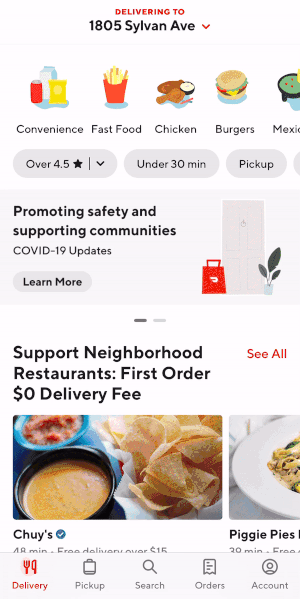Uber announced today that it will launch grocery delivery in select cities this month. The announcement comes at a time when the global COVID pandemic has spurred consecutive monthly record-setting grocery e-commerce sales in the United States.
From the Uber blog post announcing the news:
Starting today, in collaboration with our partner Cornershop, customers in select cities in Latin America and Canada can order groceries through both the Uber and Uber Eats apps. And starting later this month, grocery delivery will be available in Miami, FL and Dallas, TX. In those two cities Eats Pass and Uber Pass members will receive an additional benefit, free grocery delivery on orders over $30.
According to Grocery Dive, the service will be available through the Uber and Uber Eats apps, where users can select a participating retailer and order their groceries. And though Cornershop is fulfilling orders now, Uber drivers will be able to sign up to make grocery deliveries.
Uber announced last October that it was acquiring a majority stake in Cornershop, an online marketplace for on-demand delivery from supermarkets across Chile, Mexico, Peru and Toronto. That deal still hasn’t gotten formal approval from the Chilean government, though Uber believes that will happen in a matter of days.
This grocery expansion news comes just one day after Uber announced that it was acquiring third-party delivery service Postmates for $2.65 billion. Both the Cornershop and Postmates deals show how Uber is bolstering its Eats delivery business at a time when the COVID pandemic and quarantining is hammering its ride sharing business.
The pandemic is also driving a grocery e-commerce boom. According to surveys from Brick Meets Click, online grocery shopping has had month-after-month of record setting sales as restaurants were shut down and people were forced to shelter in place. With the pandemic showing no signs of slowing down here in the U.S., getting into grocery is a smart move for Uber.
Uber is, however, facing stiff and well-funded competition. Last month, Instacart raised $225 million (and has raised $2.1 billion in total) as it has seen a surge in demand. It was also ratcheting its ranks to 750,000 Shoppers (the gig workers who shop and deliver) to increase delivery availability. Not to mention huge grocery retail players like Walmart and Amazon making and expanding their own delivery programs.
For its part, however, Uber does have a large installed user base from ride sharing and restaurant delivery that it can tap into. Now we’ll have to see what kind of an impact it can make when it comes to getting people groceries.













